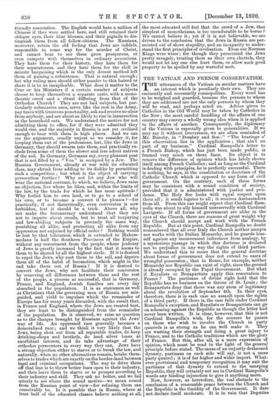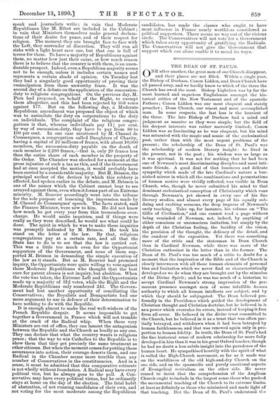THE VATICAN AND FRENCH CONSERVATISM. T HE utterances of the Vatican
on secular matters have an interest which is peculiarly their own. They are eminently and necessarily cosmopolitan. Every word has to be weighed and guarded, because the persons to whom they are addressed are not the only persons by whom they will be read, and perhaps acted on. Advice given to Catholics in the Old World may be taken by Catholics in the New ; the most careful handling of the affairs of one country may convey a wholly wrong idea. when it is applied to the affairs of another. Consequently, the diplomacy of the Vatican is especially given to generalities. If we may say it without irreverence, we are often reminded of Mr. Bunsby, in " Dombey and Son : " " The bearings o' this observation lies in the application ; that ain't no part of my business." Cardinal Rampolla's letter to a French Bishop, which has just been made public, is framed very much on these lines. Its object is to remove the difference of opinion which has lately shown itself among French Catholics ; and as long as the Cardinal is dealing with principles, he is perfectly successful. There is nothing, he says, in the constitution or doctrines of the Catholic Church which is opposed to any form of civil government. On the contrary, each of these forms may be consistent with a sound condition of society, provided that it is administered with justice and pru- dence. The Holy See looks with equal respect upon them all ; it sends legates to all ; it receives Ambassadors from all. From this one might expect that Cardinal Ram- polla was about to ally himself unreservedly with Cardinal Lavigerie. If all forms of government are alike in the eyes of the Church, there are reasons of great weight why the Church should accept and work with the French Republic. But at this point, Cardinal Rampolla no doubt remembered that all over Italy the Church neither accepts nor works with the Italian Monarchy, and he guards him- self against any inconvenient inferences from analogy, by a mysterious passage in which this doctrine is declared not to prejudice in any way the rights of third parties. We understand this to mean that the general doctrine about forms of government does not extend to cases of wrongful possession ; that in Rome, for example, neither Monarchy nor Republic can exist of right, since the ground is already occupied by the Papal Government. But what if Royalists or Bonapartists apply this reservation to France ? The partisans of divine right hold that the Republic has no business on the throne of St. Louis ; the Bonapartists deny that there was any atom of legitimacy about the revolution of September 4th. In their eyes, therefore, there is in each case an assault upon the rights of a third party. If there is, the case falls under Cardinal Rampolla's exception, and Royalists or Bonapartists can go on scheming against the Republic as though the letter had never been written. It is clear, however, that this is not Cardinal Rampolla's wish, for the censure he passes on those who wish to involve the Church in party quarrels is as strong as he can well make it. They are wasting their strength and doing a great injury to France, and to the Catholic traditions which are the glory of France. But this, after all, is a mere expression of opinion, which must be read in the light of the general principle before stated. The cause of an unjustly dethroned dynasty, partisans on each side will say, is not a mere party quarrel ; it is of far higher and wider import. What- ever provisional and temporary recognition it may suit the partisans of that dynasty to extend to the usurping Republic, they will certainly not see in Cardinal Rampolla's words any binding injunction to give it anything more. Now, however, as heretofore, the real obstacle to the conclusion of a reasonable peace between the Church and the Republic is the timidity of the Government. It dare not declare itself moderate. It is in vain that Deputies speak and journalists write ; in vain that Moderate Republicans like M. Ribot are included in the Cabinet ; in vain that Ministers themselves make general declara- tions of their desire for peace, and of their respect for religion. The moment they are brought face to face with the Left, they surrender at discretion. They will run all risks with a light heart save one, but that one is full of terror for them. To have a majority of Republicans against them, no matter how just their cause, or how much reason there is to believe that the country is with them, is an unen- durable prospect. Indeed, even a Republican majority seems not to be enough, unless it includes certain names and represents a certain shade of opinion. On Tuesday last they had a singularly good opportunity of proving their emancipation from these unworthy fears. It was the second day of a debate on the application of the succession- duty to religious congregations. On the previous day, M. Pion had proposed, on behalf of the Right, to exempt them altogether, and this had been rejected by 358 votes against 177. But on the following day, a Moderate Republican amendment was proposed the object of which was to assimilate the duty on corporations to the duty on individuals.' The complaint of the religious congre- gations is that, whereas individuals pay 111 per cent. by way of succession-duty, they have to pay from 80 to 100 per cent. In one case mentioned by M. Clausel de Coussergues, a congregation called Daughters of Charity, having a capital of 23 millions of francs, with about 10,000 members, the succession-duty payable on the death of each member is 2,280 francs,—that is, only 20 francs less than the entire share of each member in the property of the Order. The Chamber was shocked for a moment at the gross injustice of such a tax as this, and if the Government had at once accepted the motion, it would probably have been carried by a considerable majority. But M. Brisson, the principal author of the devices by which this robbery is effected, had spoken earlier in the debate, and M. Brisson is one of the names which the Cabinet cannot bear to see arrayed against them, even when it forms part of an Extreme minority. M. Rouvier accordingly went into the tribune for the sole purpose of lessening the impression made by M. Clausel de Coussergues' speech. The facts stated, said the Finance Minister, were new to him. He did not know how much he got every year from this tremendous over- charge. He would make inquiries, and if things were really as they were described, he would see what could be done. The spirit in which he was to make these inquiries was promptly indicated by M. Brisson. He took his stand on the letter of the law. By that, religious congregations pay at a certain rate, and all that the State has to do is to see that the law is carried out. This was a little too much even for the Opportunist supporters of the Government, and none of them sup- ported M. Brisson in demanding the simple execution of the law as it stands. But as M. Rouvier had promised inquiry, the Opportunists were quite willing to vote against those Moderate Republicans who thought that the best cure for patent abuses is not inquiry, but abolition. When the -vote was taken, the Extreme Left and the Opportunists made up a majority of 312 votes, while the Right and the Moderate Republicans only numbered 243. The Govern- ment had lost another opportunity of conciliating the Conservatives; the Royalists and Bonapartists had one more argument to use in defence of their determination to have nothing to do with the Republic.
It is enough almost to make the real well-wishers of the French Republic despair. It seems impossible to get together a Government in France which will not tremble at the crack of the Radical whip. When these very Ministers are out of office, they can lament the antagonism between the Republic and the Church as loudly as any one. They can declare that what the country wants is religious peace ; that the way to win Catholics to the Republic is to show them that they get precisely the same treatment as other citizens. But when the moment comes for putting these assurances into action, their courage deserts them, and one Radical in the Chamber seems more terrible than any number of Conservatives in the constituencies. And in a sense, it must be admitted that this comparative estimate is not wholly without foundation. A Radical may have every political vice, but he always goes to the poll. A Con- servative may have every political virtue, but he ordinarily stays at home on the day of the election. The fatal habit of abstention, of not running-candidates of their own, and not voting for the most moderate among the Republican candidates, has made the classes who ought to have most influence in France nearly worthless considered as political supporters. There seems no way out of the vicious circle. The Conservatives will not vote for a Government which takes every opportunity of gratifying the Radicals. The Conservatives will not give the Government that support which can alone enable it to mend its ways.











































 Previous page
Previous page